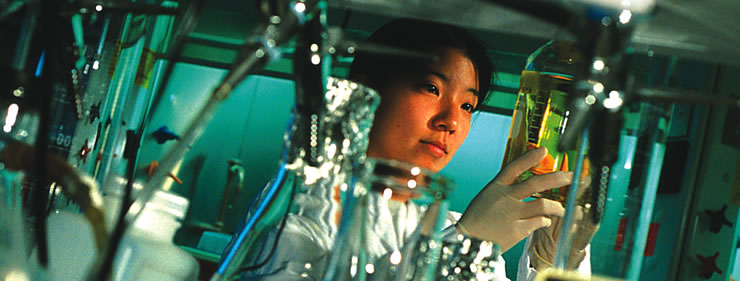The Doctor of Philosophy in Chemical Engineering Practice is a relatively new degree program built on existing strengths within the Department’s research activities, the unique resources of the David H. Koch School of Chemical Engineering Practice, and the world class resources of the Sloan School of Management. It is designed to prepare students for a fast launch into positions of leadership in industry and provides them with a foundation for completing an M.B.A. degree. It is a fixed-term degree program, requiring four calendar years; the first year is spent in course work and the Practice School, the middle two years are spent in research, and the final year is spent in the Sloan School of Management.
Ph.D. CEP Program Elements
The Ph.D. CEP program has 5 clearly-identifiable elements which will be completed by the student. There are aspects of the program which are designed to help the students integrate the material contained in the individual pieces of the program.
- Element 1 – Core Chemical Engineering Graduate Subjects
- Element 2 – The School of Chemical Engineering Practice (CEP)
- Element 3 – Research Project
- Element 4 – 1st Year of the MIT Sloan MBA
- Element 5 – Integrative Perspective Paper (Capstone Paper)
The degree requires that you complete:
- The core curriculum, as well as the departmental biology requirement
- Practice School requirements, including a one-semester industrial internship (culminating in an M.S.CEP degree)
- Written and oral qualifying examinations
- Thesis describing original research
- Coursework at the Sloan School of Management
- Capstone paper, combining technical experience with business training, appended to the thesis
Advisors
For incoming, first-year graduate students, academic advisors are members of the Committee for Graduate Students. When you select a research topic and begin your thesis, the research supervisor becomes your academic advisor. In general, students choose research advisors at the end of their first Fall semester at MIT. Should you wish to choose a research advisor from a department other than Chemical Engineering, you will also need to choose a co-advisor from the Chemical Engineering faculty.
Prior to Registration Day (Fall and Spring semesters), your subject selection must first be approved by your advisor before the Graduate Officer can authorize registration on Registration Day. Advisor approval should also be obtained for any subsequent subject add/drop actions during the term (no additional authorization by the Graduate Officer is required).
Program Admission
Students interested in the Ph.D.CEP program should direct their applications to the Chemical Engineering Graduate Admissions Committee during the regular admission cycle. Applications for Ph.D.CEP will only be considered for September matriculation. Applications will be reviewed by both MIT Sloan and Chemical Engineering and they must receive approval of both for admission to the Ph.D.CEP program. The Test of English as a Foreign Language (TOEFL) or the International English Language Testing System (IELTS) is required of applicants whose first language is not English. Unofficial (self-reported) GRE general exam scores are recommended for PhDCEP applicants.
An interview at MIT in late February will be part of the application process in most cases. Applicants will be interviewed over the phone.
The traditional Ph.D./Sc.D. program and the new Ph.D.CEP program are separate and distinct paths to the doctoral degree in the Chemical Engineering Department at MIT. The Ph.D.CEP program will be limited to 10 or fewer students per year. Because the focus and educational goals of the Ph.D.CEP are substantially different from those of the traditional Ph.D./Sc.D. program, the two programs are expected to appeal to two different populations of applicants. Applicants for graduate study should submit only one application, and indicate for which program they wish to be considered. Applications made to both programs are deemed inconsistent, and therefore discouraged. Applicants are expected to consider carefully the offerings of each program in relation to their own goals and aspirations, and to choose a program accordingly. Transfer between programs will not be permitted except as outlined earlier.
You can obtain the information that you will need to apply to MIT’s graduate programs from the MIT Graduate Admissions web site.
For more information about admission to the Ph.D.CEP program, please contact:
Assistant Director of Academic Program Administration
ChemE Academic Office
Department of Chemical Engineering
Massachusetts Institute of Technology
Room 66-366
77 Massachusetts Avenue
Cambridge, MA 02139
Email: melaniec@mit.edu
Graduate Admission Chair
Department of Chemical Engineering
Massachusetts Institute of Technology
77 Massachusetts Avenue
Room 66-458A
Cambridge, MA 02139
Phone: 617.253.4975
Email: tisdale@mit.edu
For general information about the Ph.D.CEP Graduate Program, please contact:
Graduate Officer
Massachusetts Institute of Technology
77 Massachusetts Avenue, Room E-19-502C
Cambridge, MA 02139
Tel: 617.253.5224
Email: sikes@mit.edu
Tuition & Financial Aid
Students accepted into the PhDCEP program will be supported via Chemical Engineering Department fellowships during the first calendar year; they will be awarded research or teaching assistantships during the entire period of participation in the thesis research project. During the final year of the program, PhDCEP students will pay tuition and living expense costs from their own resources, or from graduate student loans available through MIT and other third-party sources. It is important to note that the tuition costs for this final year will be somewhat larger than the standard MIT graduate tuition because enrollment in the MIT Sloan MBA program requires a premium tuition payment. Get more information from Student Financial Services >>


